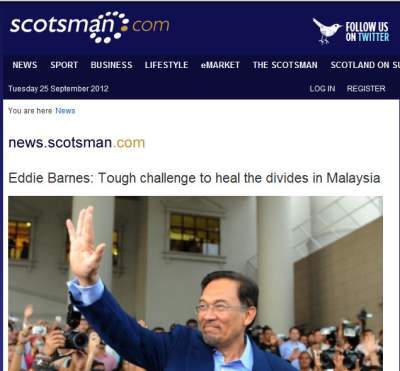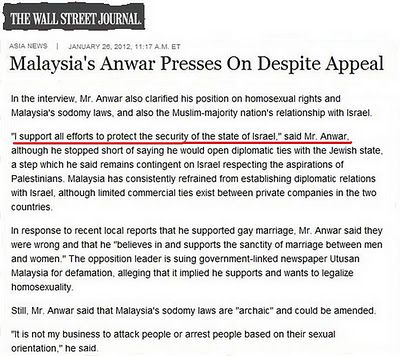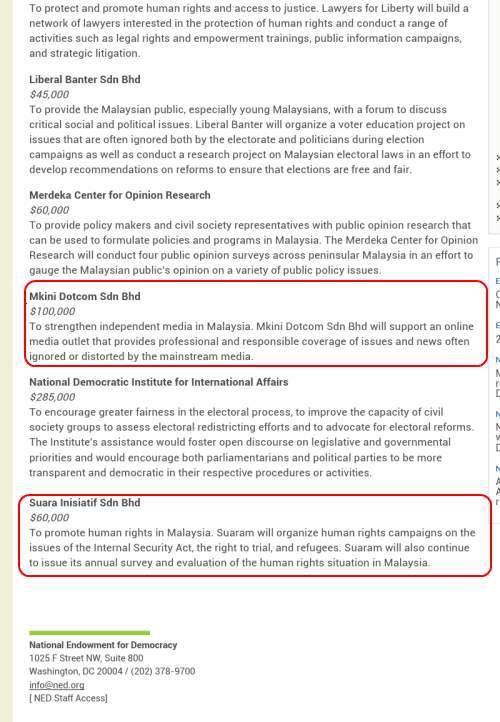The Scotsman
Monday 24 September 2012

Anwar Ibrahim aims to upset the political status quo in multicultural Malaysia, writes Eddie Barnes.
Anwar Ibrahim is an unnoticed, softly-spoken presence in the smart London hotel where he is staying. But, in a year which has seen plenty of unexpected political revolutions across the world, here is the man who may lead the next one.
Dr Ibrahim is about to return to Malaysia where his coalition is preparing to try and usurp the ruling Barisan Nasional alliance which has run the wealthy south-east Asian country for the last 50 years. The BN is faltering, failing to meet the expectations of an increasingly sophisticated urban class and beset by allegations of vote-fixing, corruption and cronyism.
But, in a country which is divided by religion and between its dominant Malay, Chinese and Indian ethnic groups, the challenge is both to demonstrate an alternative and to put it into practice.
Dr Ibrahim, who is in town with Azeem Ibrahim, the Scottish businessman who acts as one of his international aides, has one of the great political back stories. The foremost Muslim activist of his day, he was groomed in the 1980s and 1990s by Malaysia’s authoritarian ex-prime minister Mahatir Mohamad to be leader of the main Malay party, UMNO, which dominates the BN alliance.
But, as the pair moved apart, Mr Mahatir brutally cast him aside and, within weeks, Dr Ibrahim faced trumped up sodomy and corruption charges. He was sentenced in 1999 to six years in jail, getting out in 2004. Now, at the age of 65, and suffering from a chronically bad back, he has turned fire back on his old party colleagues, forming a cross-racial alliance of his own, called Pakatan, which makes the Conservative-Lib Dem team look like childhoold sweethearts. In the middle, Dr Ibrahim’s new PKR party represents mainstream Malays who want an alternative to the status quo.
On his right is the Islamist group PAS, whose members would like to introduce Hudud (religious) laws to the country. To his left he has the Chinese-Indian DAP, which wants to guarantee a secular future of the nation, and better rights for the country’s non-Malays.
It already looks tough for him – only last week, people in the DAP were complaining about plans by PAS to introduce Hudud. In Malaysia, a huge pro-?democracy rally earlier this year called Bersih (or “Clean”) demonstrated the enormous desire for fair elections. Dr Ibrahim’s coalition stands on that ticket of a more open country with a free press. He notes: “You cannot suggest that society is not prepared to experience a more mature democracy. For ten years you can blame the British for the poor education and people not familiar with the system. But not after 50 years.”
A modern traditionalist, he avoids easy categorisation as a Muslim leader, and is easy to misrepresent. He says he is not a liberal and remains rooted in the Islamic movement. But he says he believes in taking a “hard line” on harsh views on both sides of the debate.
On the violent reaction to the blasphemous video insulting Islam, he agrees there is a “problem with the Muslim psyche … people are easily enraged and emotional.” As to the outrage displayed by Malaysia’s governing class, he declares: “The hypocrisy of these fellows talking about defending Islam when they are so blatantly corrupt and unjust. That is the ruling clique all over.”
But he also accuses the West of bias against Islam. He has a deep love of America and its founding values, but adds: “Even the so-called more sophisticated Americans are so filled with Islamophobia. I have a better understanding of Christianity than they do of Islam.”
What he wants is an intelligent response. He scorns the “crazy” move by Malaysia’s ministry of education last week to publish a much-mocked guide on how to spot if someone is a homosexual (which remains illegal in conservative Malaysia).
So can he win? He doesn’t think the election will be clean, accusing UMNO of bringing in “phantom voters” from the neighbouring Philippines and Indonesia to bump up their support. “There are very high expectations,” he concedes. He says he needs to convince Malay voters that, in a racially divided society, he is going to keep their interests at heart. “But I think we will make it this time. I am really confident.”










